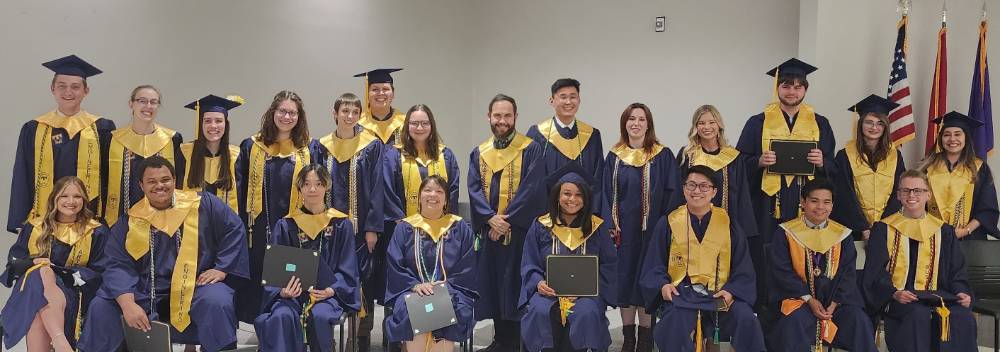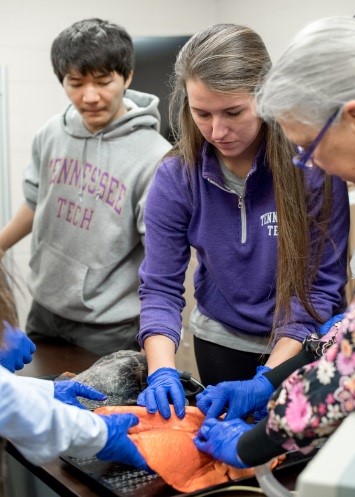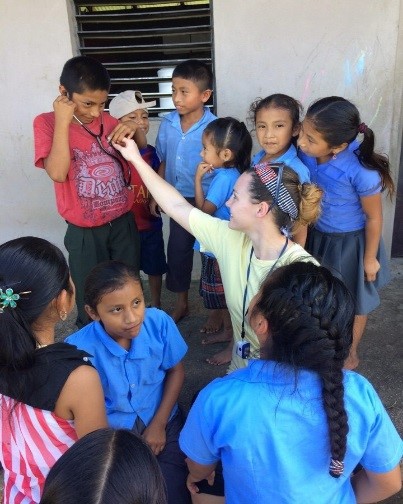Honors Program
Earning Honors Credit
Design your own unique path toward in cursu honorum graduation!
› The Basics of Earning Honors Credit
› Part One: Honors 1010
› Part Two: 15 Credits in Honors Courses, Honors Contracts or Experiential Learning
› Part Three: 6 Upper-Division Credits
› Graduating In Cursu Honorum
Looking for Honors credit for the spring semester? See the Fall 2024 course offerings »
Don't see a course you need? Learn about the many proposal-based ways to tailor your own education while earning
Honors credits »
April 8 is the absolute deadline for submitting all proposals for Fall 2024.
The Basics
Honors students must earn Honors credit each semester until their 22 hours in Honors are complete.
The three components of earning your 22 Honors credits are:
-
- Honors 1010,
- 15 credits distributed over three different areas, and
- 6 credits comprised of at least one Honors Colloquium and one of the options described in section three below.
Maintaining Your Benefits
In order to keep your benefits, stay active in Honors by earning Honors credit every semester until you've finished the 22 hours. If it seems impossible to do so as you plan for your next semester, make an appointment with Dr. Barnes during the semester before that "impossible" semester.
Consider the Honors Minor
Add the Honors Minor (optional, and open to Honors students only). Why? The Honors Minor on your transcript will still recognize completion of all 22 Honors credit requirements if you graduate with an institutional GPA between 3.1 and 3.49.
In Cursu Honorum Graduation Requirements
The requirements for graduating in cursu honorum — the highest level of academic recognition — also requires a final 3.5 institutional GPA and completion of the Honors exit interview.
Part One — Honors 1010:
The first required course is HONORS 1010 — Introduction to Honors (1 cr).
This course is required during the first fall semester after entering the Honors Program without exception. Honors 1010 can sometimes substitute for an introductory course required in your major. Please ask your advisor.
The Honors Healthcare Track section of Honors 1010 offers a transdisciplinary cohort of other Honors freshmen regardless of major who want to be part of the future of healthcare. Ask us about this option!
Part Two — Honors Courses, Contracts, and Experiential Learning
After completing Honors 1010, students must complete 15 credits of Honors learning in at least three different disciplines (for example, a student might take Honors credits in Biology, Professional Communications, and Chemistry). The Honors program offers a flexible, customizable program, allowing students to create their own journey.
Students can choose from small, interactive classes open only to Honors Program students;
contract options, which allow students to create customized course options; or experiential
learning.
Honors Courses
Honors courses are comprised of Honors students only. They contain fewer than 20 students usually, which is significantly smaller than a typical section of the same course. Honors courses are offered in various departments including but not limited to subjects that meet General Education requirements; other Honors offerings include Microbiology, Programming for Engineers, Transportation Engineering, Anatomy & Physiology I, and Leadership Development. All courses are not available every semester.
If you don't see an Honors course you need, consider proposing either an Honors Contract or Experiential Learning. Read on to see what meets your individual needs to build a meaningful Honors education.
See the Honors Course Schedule for FALL 2024 »
Honors Contracts
Honors Contracts are different than Honors courses. The Honors Contract lets you work with a professor to devise a special project as a supplement to a regular course you will be taking—if an actual Honors version of the course doesn't exist. A Contract is a great way to customize a required course in your major. Students are eligible to earn credit by contract after successfully completing their first semester in Honors.
What's more, Honors Contracts are a practice run on the contracts, grants, and other professional agreements you will need to make throughout your adult life.
To propose your Honors Contract, you must write a proposal and submit it to Honors by the announced deadline (usually one week after registration begins, the semester before you plan to carry out the Contract). The Honors Contract Proposal Form shows you the steps to take in planning with your professor.
See the Honors Contract Proposal Form for FALL 2024
Honors Experiential Learning
If you plan to participate in an intensive study abroad program, faculty-mentored research, community-engaged service leadership, or competitive major-specific internships or field work, Honors Experiential Learning is yet another way to earn Honors credits toward the 15-hour block.
It requires an Honors Experiential Learning proposal form, which must be pre-approved by the deadline during the previous semester (usually one week after registration begins, in the middle of the semester before you plan to do Experiential Learning).
Start Your Experiential Learning Journey Early
It's best to start your proposal much earlier with a visit to Dr. Barnes. She can help you ensure that appropriate aspects of the proposal are feasible for Honors credit eligibility. This individualized option takes time to set up, but it's an investment in a career-building opportunity!
You can also use Honors Experiential Learning to earn credits during the summer. Because they are academic credits, they do require that you consider your credit-hour load.
See the Experiential Learning Proposal Form for FALL 2024 »
Part Three — Upper Division Credits
Once you've finished your 15 credits, it's time for advanced Honors credits! Students must complete 6 credits of upper-division Honors courses. The Honors experiences listed in this section are normally taken after completing at least 9 credit hours of Honors courses. Priority is given to upper-level students who have completed most of their Honors requirements and are planning to graduate in cursu honorum.
To fulfill your 6 upper-division Honors credits, students must first take at least
one Honors Colloquium (worth 3 credit hours). Honors Colloquia will be announced after approval by Honors Council.
1. Honors Colloquium (3 Credit Hours)
An Honors Colloquium (pronounced kuh-low-kwee-um) is a unique upper-division seminar with an interdisciplinary
focus. Each Colloquium is a three-credit, 4000-level course on a topic not taught
at Tech. The professor proposing the course must have advanced academic credentials
in the topic area. Colloquium proposals are reviewed by the Honors Council each semester.
Honors Colloquia, like all Honors classes, are strictly for Honors Program students
only, and are one of the most popular benefits of Honors.
2. Choose Your Final Course (3 Credit Hours)
After the completion of the Honors Colloquium, students must choose from one of the following proposal-based options, worth an additional 3 credit hours minimum:
Option 1: An additional Honors Colloquium
Students may, if they wish, complete a second Honors Colloquium. As with your first Colloquium, you must submit a proposal for review by the Honors Council.
Option 2: Proposal-based alternatives
All of the following proposal-based options require approval by the announced deadline during the semester prior to enrolling in that option.
-
-
-
- Honors Upper Division in the Major, an individually pre-approved culminating honors-level experience throughout your major's capstone, thesis, practicum, senior design, or senior seminar; or through advanced faculty-mentored research or a graduate course in your major.
- Honors Directed Study, an independent study under the supervision of a professionally qualified faculty member.
- Honors Interdisciplinary Thesis Option, a two-semester sequence that may be linked to major coursework by special arrangement. The Thesis Option requires preparation at least one semester before registering for the first of the two semesters. Writing a thesis demonstrates your knowledge of a focused topic, ideal for grad school preparation. If you wish to consider the Thesis Option, please meet with Dr. Barnes one full semester in advance.
- Chemical Engineering Distinction in the Major, for ChemE majors only by arrangement with a supervising research mentor. Contact the Department of Chemical Engineering for details.
-
-
Please make an appointment with Dr. Barnes at least one semester in advance if you are considering one of the alternatives to a second Colloquium (or see your ChemE research mentor for Distinction in the Major); these alternatives require your proactive and timely planning.
Graduating In Cursu Honorum
If you are graduating in cursu honorum, your final requirement is to schedule your Honors Exit Interview with Dr. Barnes and your major faculty mentor, to be held before mid-semester of your graduation term.





